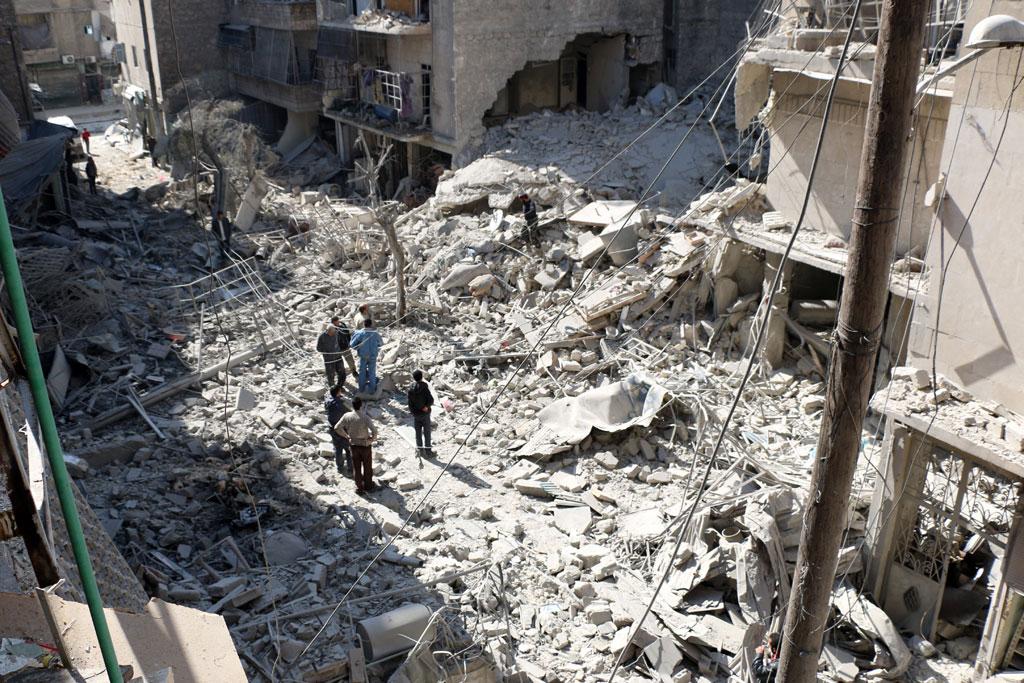UN report calls on Security Council to refer Syrian atrocities like ‘starvation until submission’ to the ICC
Syrians stand in the rubble following a reported air strike attack by government forces on the northern Syrian city of Aleppo on Feb. 18, 2014.
All sides in Syria's civil war are using shelling and siege tactics to punish and starve civilians and big powers bear responsibility for allowing such war crimes to persist, UN human rights investigators said on Wednesday.
The independent investigators, presenting their latest report documenting atrocities in Syria, called again on the UN Security Council to refer grave violations of the rules of war to the International Criminal Court (ICC) for prosecution.
"The Security Council bears responsibility for not addressing accountability and allowing the warring parties to violate these rules with total impunity," Paulo Pinheiro, who leads the UN commission of inquiry, told a news conference.
"One of most stark trends we have documented is the use of siege warfare, the denial of humanitarian aid, food and basic necessities such as medical care and clean water have forced people to choose between surrender and starvation."
More than 140,000 have been killed in the conflict, which enters its fourth year next week, 2.5 million refugees have fled abroad and 6.5 million people are uprooted within Syria.
Divided world powers have backed both sides in the conflict and a diplomatic deadlock has exacerbated the bloodshed.
Fighters and their commanders may be held accountable, but also states which transfer weapons to Syria, the report said.
Syrian government forces under President Bashar al-Assad have besieged towns including the Old City of Homs, shelling relentlessly and depriving them of food as part of a "starvation until submission" campaign, the report said.
It said the Syrian air force had dropped barrel bombs on Aleppo with "shocking intensity," killing hundreds of civilians and injuring many more.
"I remember most vividly speaking to a doctor who was treating survivors of barrel bomb attacks. Some victims including infants had lost limbs," said Pinheiro.
Insurgents fighting to topple Assad, especially foreign Islamic fighters including the Al Qaeda affiliated ISIS, have stepped up attacks on civilians, taken hostages, executed prisoners and set off car bombs to spread terror, it said.
The report, covering July 15 to Jan. 20, is the seventh by the United Nations since the inquiry was set up in Sept. 2011, six months after the anti-Assad revolt began.
The investigators have not been allowed into Syria, but their latest findings were based on 563 interviews conducted by Skype or by telephone with victims and witnesses still in the country or in person with refugees in surrounding countries.
Four lists of suspects
All sides have violated the rules of war embodied in the Geneva Conventions, according to the team of two dozen who include former UN war crimes prosecutor Carla del Ponte.
It has now drawn up four confidential lists of suspects.
War crimes had been committed on both sides, including torture, massacres, rapes and recruitment of child soldiers.
Pinheiro, asked about Assad's responsibility, declined to be more specific about names on the lists of suspects. "We mentioned several times the responsibility of people in high echelons in the government."
"The reports, if they were not able to ensure accountability in the present, I think that they will be important material for the future. But also our data bank and list of perpetrators that we have established," he added.
Despite some tactical gains by Syrian government forces backed by more foreign combat forces of Lebanese Hezbollah and Iraqi militia, the fighting has reached a stalemate, causing significant casualties and material losses, the report said.
"The government relied extensively on the superior firepower of its air force and artillery, while non-state armed groups increasingly resorted to methods of asymmetric warfare, such as suicide bombs and use of improvised explosive devices."
As part of a strategy aimed at weakening the insurgents and breaking the will of their popular base, government forces have besieged and bombarded civilian areas, it said.
"Partial sieges aimed at expelling armed groups turned into tight blockades that prevented the delivery of basic supplies, including food and medicine, as part of a 'starvation until submission' campaign."
Rebels throughout Syria have "inflicted severe physical or mental pain or suffering on civilian populations in areas under their control," including on prisoners, it said.
Referring to the northern Raqqa area under control of an Al Qaeda affiliate, the Islamic State of Iraq and the Levant, the report said: "The acts committed by non-state armed groups … in areas under their control against the civilian population constitute torture and inhuman treatment as a war crime and, in the context of (Raqqa), as a crime against humanity."
Rebels have encircled Nubl and Zahra, besieging 45,000 people in the two Shia towns in Aleppo province, it said.
"The siege is imposed by groups affiliated to the Islamic Front, Jaish Al Mujahedeen, Jabhat Al-Nusra and the Syrian Revolutionary Front by checkpoints erected around the area and by cutting off their electrical and water supply lines."
(Additional reporting by Oliver Holmes in Beirut Editing by Ralph Boulton)
We want to hear your feedback so we can keep improving our website, theworld.org. Please fill out this quick survey and let us know your thoughts (your answers will be anonymous). Thanks for your time!
